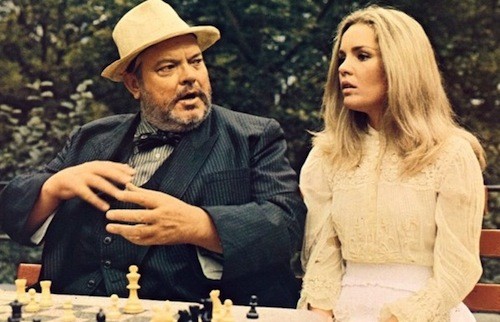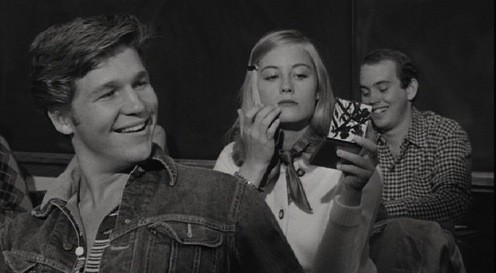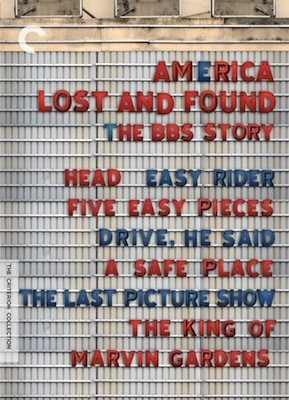
-
The Monkees in Head (All photos courtesy of the Criterion Collection)
AMERICA LOST AND FOUND: THE BBS STORY (1968-1972). Despite — or perhaps enhanced by — the inclusion of two hotly debated duds, this nine-disc, seven-film set from Criterion is an invaluable addition to any cineast's permanent library. It covers that brief period when Bob Rafelson, Bert Schneider and Steve Blauner combined their first initials to create BBS Productions, an outfit devoted to producing artful films primarily for youthful audiences tired of Hollywood's conventional offerings. And the primary glue holding the canon together is Jack Nicholson — he appears as actor, director and/or screenwriter on six of the seven films, and his efforts turned him into a star.
Davy Jones gets beaten to a pulp by Sonny Liston, Micky Dolenz wages war in the desert against a Coca-Cola machine, Frank Zappa shows up with a talking cow, and Victor Mature towers over the proceedings — literally — as "The Big Victor." And so it goes in Head (1968), a showcase for The Monkees that was co-written by Nicholson and director Bob Rafelson. The pop group's answer to The Beatles' classic A Hard Day's Night, this insane outing purportedly looks at a day in the life of Jones, Dolenz, Peter Tork and Michael Nesmith but is really just an excuse to mesh together musical numbers, Vietnam War footage, and a dizzying amount of non sequiturs.

-
Peter Fonda and Dennis Hopper in Easy Rider
BBS's next movie, Easy Rider (1969), joined the likes of The Graduate and Bonnie and Clyde as one of the most influential movies of the decade; it also proved to be a gargantuan hit with young moviegoers. Peter Fonda (also producing and scripting) and Dennis Hopper (director as well as co-writer with Fonda and Terry Southern) headline as the hippie bikers whose ride across the country exposes them to good old-fashioned American bigotry, yet it's Nicholson who steals the show (and earned the first of his countless Oscar nominations) as a hip lawyer who joins them on their journey.

-
Jack Nicholson and Karen Black in Five Easy Pieces
A new kind of film when released in 1970, Rafelson's Five Easy Pieces dared to make its protagonist, Bobby Dupea (Nicholson), often unlikable. Yet in his inability to get a grasp on his own values and self worth, it also made him an easily relatable character for its turbulent time. Nicholson's performance as an oil-rigger who's soon revealed to be a pianist escaping from his upper-class roots stands as one of his finest (who can't help but love the classic "chicken salad sandwich" scene?), while Karen Black, as his simple, doting girlfriend, is equally excellent.

-
William Tepper in Drive, He Said
Nicholson made his directorial debut with (and co-wrote the script for) Drive, He Said (1971), a dour work that hasn't held up as well as its celluloid soulmates. The story focuses on two college roommates — a basketball player (William Tepper) and a campus radical (Michael Margotta) — but Bruce Dern provides the only juice as a tough-yet-tender coach.

-
Orson Welles and Tuesday Weld in A Safe Place
So-called "talky filmmakers" are generally love-'em-or-leave-'em propositions, and while I'm a fan of both Eric Rohmer and John Cassavetes, Henry Jaglom can leave me cold. He made his writing-directing debut with A Safe Place (1971), a pretentious, confusing drama about a schizophrenic free spirit (Tuesday Weld) juggling two suitors (Nicholson and Phil Proctor). It's fun to see Orson Welles in the magician stage of his career, but your enjoyment of the film will largely depend on your tolerance for Jaglom's often cringe-worthy dialogue.

-
Jeff Bridges and Cybill Shepherd in The Last Picture Show
The Last Picture Show (1971), an American classic by writer-director Peter Bogdanovich and co-writer Larry McMurtry (adapting his own novel), takes a leisurely, loving look at the residents — both young (Timothy Bottoms, Jeff Bridges and Cybill Shepherd) and seasoned (Ellen Burstyn, Ben Johnson and Cloris Leachman, the latter two winning Oscars) — of a tiny Texas town in the 1950s. Filmed in black and white, the picture mixes its sense of nostalgia for a bygone era with its clear-eyed depiction of the sheer boredom that can penetrate the lives of small-town folks with few options available to them.

-
Bruce Dern and Jack Nicholson in The King of Marvin Gardens
The final BBS title, The King of Marvin Gardens (1972), is best described as an interesting misfire that gets by on its unique approach and fine performances. Nicholson contributes an interesting turn as a perpetually pessimistic radio commentator who gets roped into a shady real-estate scheme by his motormouth brother (Dern) and the latter's eccentric girlfriend (Burstyn). This offbeat picture doesn't seem like much upon initial viewing but has a way of sticking with you.

Extras in this DVD box set include a 112-page booklet; audio commentary on five of the seven pictures (including The Monkees on Head, Hopper and Fonda on Easy Rider, and Bogdanovich on The Last Picture Show); two documentaries on BBS; new interviews with Nicholson, Rafelson, Bogdanovich and others; making-of pieces; and screen tests for Head, A Safe Place and The Last Picture Show.
Head: ***
Easy Rider: ***1/2
Five Easy Pieces: ***1/2
Drive, He Said: **
A Safe Place: *1/2
The Last Picture Show: ****
The King of Marvin Gardens: ***
Extras: ****
For reviews of more new DVD and Blu-ray releases, check out tomorrow’s View From The Couch column here at www.clclt.com/film.
